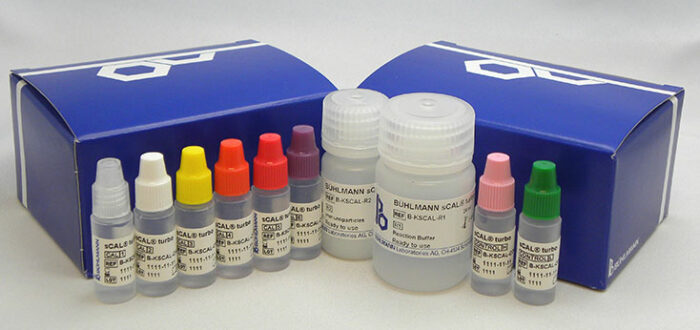Following on from the success of the fCAL® turbo and the fPELA® assays, BÜHLMANN has now launched the sCAL® turbo for serum calprotectin, that operates on the same principles as its predecessors. The BÜHLMANN sCAL® turbo runs on the mainstream clinical chemistry analysers and the time to first result is 10 minutes, with further results
- [email protected]
- +44 (0) 23 8048 3000
Calprotectin News
This article from the Mid and South Essex NHS Foundation Trust discusses the recent implementation of the BÜHLMANN IBDoc® Calprotectin Home Test within their Trust. You can also read about this implementation in our latest issue of Perspective. We talked to some of the key team members about their focus on introducing new technologies to
Faecal calprotectin (FC) is now part of the new official European Crohn’s and Colitis Organisation (ECCO) and the European Society of Gastrointestinal and Abdominal Radiology (ESGAR) guidelines.
The New Faecal Calprotectin Care Pathway, developed by Dr James Turvill, Consultant Gastroenterologist at York Teaching Hospitals NHS Foundation Trust, and implemented by the Yorkshire and Humber AHSN, supports the implementation of NICE guidance DG11, for the detection of inflammation in the bowel (i.e. IBS vs IBD). The innovative and sensitive pathway based will help
A report from BIVDA and Innovate UK has identified that wider use of some IVD tests could save money and improve patient care. As we celebrate the 70th anniversary of the NHS is this one way to strengthen its future? Calprotectin is one of the tests identified in the report. It is already utilised in the NHS,
Calprotectin Testing Goes Mobile With advances in technology and the ubiquitous use of mobile devices, a huge opportunity has arisen to change the way some healthcare services are provided. This is especially applicable to the management of chronic conditions. With most people owning a mobile device or tablet this becomes a convenient way for patients to
On 4th December 2017 the National Institute for Health and Care Excellence issued a Medtech Innovation Briefing [MIB132]: ‘Point-of-care and home faecal calprotectin tests for monitoring treatment response in inflammatory bowel disease’. This describes the innovative aspect that test results can be acted on more quickly than waiting for standard laboratory tests and could help reduce colonoscopies and clinical appointments. Costs may







